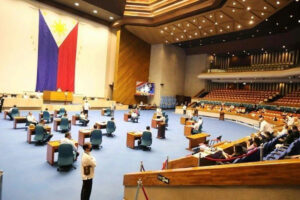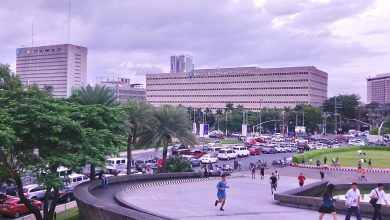Congress ratifies P5.77-T national budget

By John Victor D. Ordoñez, Reporter
PHILIPPINE LAWMAKERS on Monday ratified the Bicameral Conference Committee report on the P5.768-trillion national budget for 2024, with the education, infrastructure, and defense agencies receiving the biggest increases.
This came after the Bicameral Conference Committee reconciled the conflicting provisions of the proposed General Appropriations Act of 2024 and approved around P450 billion in changes to new appropriations.
After Congress’ ratification, the budget measure will be sent to Malacañang for President Ferdinand R. Marcos, Jr.’s signature.
Mr. Marcos is expected to sign the 2024 national budget before he leaves for Japan to attend the 50th anniversary of the Association of Southeast Asian Nations-Japan Friendship and Cooperation commemorative summit from Dec. 16 to 18.
“Education remains a top priority in our expenditure plan for 2024. The increases made to our education agencies support ongoing efforts to make educational opportunities more available and accessible,” Senator Juan Edgardo M. Angara, who heads the Senate Finance Committee, said during Monday’s plenary session before the ratification of the report.
Under the Constitution, the government must prioritize funding the education sector. For 2024, the education sector has been allocated P924.7 billion, of which the Department of Education (DepEd) will receive P758.6 billion.
Citing the consolidated measure, Senate Majority Leader Emmanuel Joel J. Villanueva told plenary that the budgets of Technical Skills and Development Authority (TESDA), DepEd, the Commission on Higher Education (CHED), and state universities and colleges (SUCs) were increased by almost P30 billion.
Mr. Angara said additional funds were given to education agencies to implement scholarship programs, employment training programs and a voucher program for senior high school students.
However, Senate Minority Leader Aquilino Martin D. Pimentel III questioned why the bicam panel approved a P450-billion increase in unprogrammed appropriations, bringing the total to P731.4 billion. This despite the Department of Budget and Management (DBM) initially recommending a total of P281.9 billion in unprogrammed appropriations, which are funds that are put on standby in case of additional priority programs or projects when revenue collection exceeds targets.
“The reason is to carve out fiscal space in the programmed appropriations for other items that are proposed by our colleagues both here and in the House,” Mr. Angara said.
Also, Mr. Villanueva said the Department of Trade and Industry’s budget was increased by about P686 million for the government’s efforts to boost domestic production and make Philippine products more competitive with their global counterparts.
Mr. Angara said the national budget will provide “significant” funds for infrastructure, particularly roads, bridges, railways, and seaports.
“We also kept provisions to ensure that active transport infrastructure like bike lanes, pedestrian walkways, and other commuter safety features are included in their major projects,” he said.
Meanwhile, Party-List Rep. Elizaldy S. Co, who heads the House Committee on Appropriations, said bicam panel increased the allocation for irrigation projects under the National Irrigation Administration by at least P40 billion.
He told reporters that lawmakers granted the request of the Department of Agriculture (DA) for an additional P25 billion to boost the sector.
The national budget also allotted P10 billion in subsidies for the Pambansang Pabahay para sa Pilipino Program (4PH) housing program, Mr. Co said.
The spending plan also includes funding for the Ayuda sa Kapos sa Kita Program (AKAP), a social amelioration program for families earning P23,000 or less monthly.
Each beneficiary of the AKAP program would receive about P5,000 and free medical assistance, Mr. Co. said.
Lawmakers also added P 1 billion for the development of the Philippine General Hospital, National Kidney Center, Philippine Children’s Medical Center, and National Cancer Center.
Mr. Co said the panel denied the Department of Information and Communications Technology’s (DICT) request to restore its confidential funds worth P280 million for its cybersecurity programs.
Congress also stripped confidential funds from civilian agencies. Mr. Angara noted that only about P9.5 billion of these funds were realigned to security agencies mandated to use them.
The senator said the funds were transferred to defense agencies amid tensions with China in the South China Sea, citing a P2-billion budget increase for the Philippine Coast Guard.
Legislators also adopted a provision proposed by Senator Ana Theresia N. Hontiveros-Baraquel barring civilian agencies from using their contingency funds to increase their confidential and intelligence funds.
“(House Appropriations Chair) Mr. Co correctly proposed funding increases for irrigation projects as this ensures a medium-term plan to raise productivity levels in our agricultural sector, particularly rice production,” Terry L. Ridon, a public investment analyst and convenor of think tank InfraWatch PH, said in Facebook Messenger chat.
He said the move was consistent with the government’s commitment to lower the price of rice.
I-Lead Executive Director Zyza Nadine M. Suzara said Congress needs to bolster its oversight over the spending performance of state agencies after the budget bill is passed.
“We have to remember that boosts in funding allocations come with additional targets,” she said in a Viber message. “Public funds ought to be strategically allocated to what taxpayers urgently need.”




